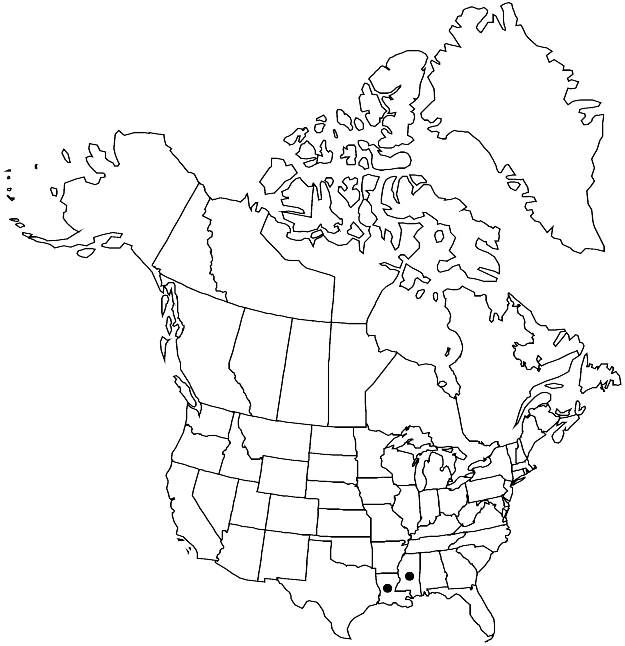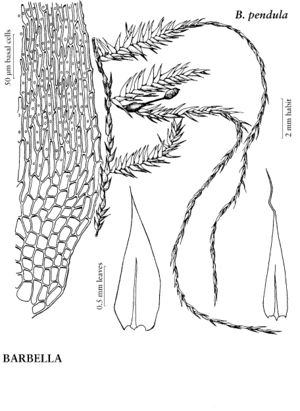Difference between revisions of "Barbella pendula"
Musc. Buitenzorg 3: 812. 1908.
FNA>Volume Importer |
FNA>Volume Importer |
||
| Line 9: | Line 9: | ||
|special_status={{Treatment/ID/Special_status | |special_status={{Treatment/ID/Special_status | ||
|code=F | |code=F | ||
| − | |label= | + | |label=Illustrated |
}} | }} | ||
|basionyms={{Treatment/ID/Basionym | |basionyms={{Treatment/ID/Basionym | ||
|name=Meteorium pendulum | |name=Meteorium pendulum | ||
|authority=Sullivant | |authority=Sullivant | ||
| + | |rank=species | ||
|publication_title=in A. Gray, Manual ed. | |publication_title=in A. Gray, Manual ed. | ||
|publication_place=2, 681. 1856 | |publication_place=2, 681. 1856 | ||
| Line 20: | Line 21: | ||
|name=Neodicladiella pendula | |name=Neodicladiella pendula | ||
|authority=(Sullivant) W. R. Buck | |authority=(Sullivant) W. R. Buck | ||
| + | |rank=species | ||
}} | }} | ||
|hierarchy=Meteoriaceae;Barbella;Barbella pendula | |hierarchy=Meteoriaceae;Barbella;Barbella pendula | ||
| Line 44: | Line 46: | ||
-->{{#Taxon: | -->{{#Taxon: | ||
name=Barbella pendula | name=Barbella pendula | ||
| − | |||
|authority=(Sullivant) M. Fleischer | |authority=(Sullivant) M. Fleischer | ||
|rank=species | |rank=species | ||
| Line 58: | Line 59: | ||
|publication title=Musc. Buitenzorg | |publication title=Musc. Buitenzorg | ||
|publication year=1908 | |publication year=1908 | ||
| − | |special status= | + | |special status=Illustrated |
| − | |source xml=https://jpend@bitbucket.org/aafc-mbb/fna-data-curation.git/src/ | + | |source xml=https://jpend@bitbucket.org/aafc-mbb/fna-data-curation.git/src/f50eec43f223ca0e34566be0b046453a0960e173/coarse_grained_fna_xml/V28/V28_752.xml |
|genus=Barbella | |genus=Barbella | ||
|species=Barbella pendula | |species=Barbella pendula | ||
Revision as of 22:17, 16 December 2019
Stems inconspicuous, branches slender, to 15+ cm. Stem leaves 1.5–2 mm; apex filiform; costa faint or strong. Branch leaves triangular-acuminate proximally, 2 mm, slender-acuminate distally, 1–1.5 mm; costa ending mid leaf; alar cells quadrate; medial laminal cells 60 µm, papillae usually (2–)3–5-seriate, on abaxial and adaxial surfaces. Perigonia unknown. Perichaetia usually on proximal portions of branches. Seta brown, 2–2.5 mm. Capsule dark brown at maturity, 1–1.5 mm; operculum 0.7–0.8 mm. Calyptra conic-mitrate, erose proximally. Spores 15–26 µm.
Phenology: Capsules mature Mar.
Habitat: Deep, cool, shady, humid ravines in deciduous forests, on Arundinaria, shrubs, tree branches, exposed roots along ravines
Elevation: low elevations (10-20 m)
Distribution

La., Miss., Mexico, Asia.
Discussion
Barbella pendula is not common in the flora area but may be abundant locally. The delicate, yellowish green plants dangle in conspicuous, tangled festoons in their ravine-bottom habitat. The striking habit of B. pendula and the somewhat dimorphic branch leaves, including the distal with 1-seriate, filiform apices, make the species unmistakable. Barbella pendula has been reported from Florida, but the collections are either Papillaria nigrescens or of uncertain provenance. Perigonia have never been found in specimens (some abundantly fruiting) of B. pendula from the flora area.
Selected References
None.
